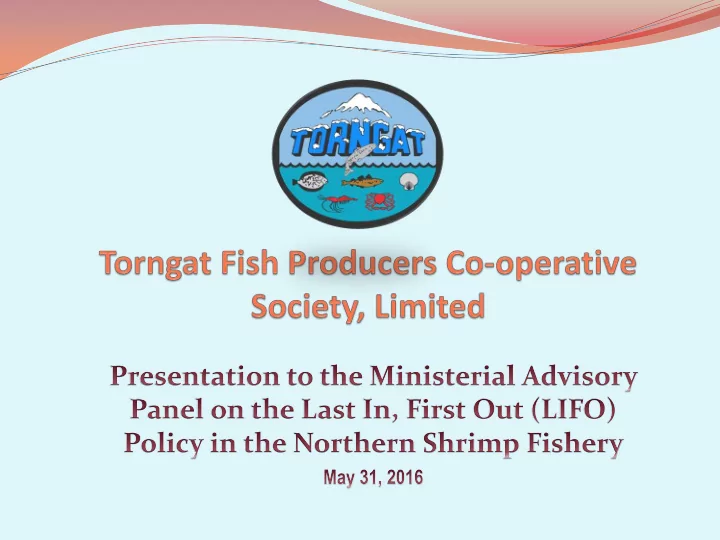

THANK-YOU
INTRODUCTION The formation of the Co-op which was a direct result of the issuance of an offshore shrimp licence for Northern Labrador. After months of due diligence and meetings a decision to form a Fishery Co-operative to serve the interest of all members was felt to be the best option The directly affected groups consisting of all Community Fisher Committees and the Labrador Inuit Association (LIA) spear headed input from all fishers, residents and the Communities.
INTRODUCTION Con’t Torngat Fish Producers Co-operative Society, Limited (Torngat) is an aboriginal co-operative incorporated in 1980 by fishers and plant workers from communities of the northern coastal Labrador. We continue to operate processing facilities in the land of Nunatsiavut. The Co-operatives membership has grown to 600+ members over the thirty-five years since Torngat’s formation. The primary purpose of Torngat is to strive to fulfill its mandate, as outlined in its By-laws, in the communities that it serves. This mandate consists of Promoting on a co-operative basis the economic interests of member; Act as a selling agent for their products; Acquire and use of the members licenses and fishing rights of all kinds; etc.
INTRODUCTION Con’t This Co-operative is open to Labrador Inuit Beneficiaries residing in the Electoral District of Torngat Mountains who are: - Fishermen and Fisherwomen, spouses & children - Fish plant workers, spouses & children - Collector boat workers, spouses & children Our main Aims & Objectives: - Promote on Co-operative basis economic interests of members, for harvesting, procuring, transporting, - Buying, selling, processing, marketing in every way fish, sea mammals, shell-fish … - Act for & on behalf of members as the selling agent of their products… - Rent, lease, operate, manage and use ships, wharves, processing plants necessary … - Acquire and use to the benefit leases, licences and fishing rights of all kinds …
INTRODUCTION Con’t This Co-operative is exempt from the Province collective bargaining, and there are no FFAW plant workers or Fishers. This Co-operative is a Registered Inuit Business (#69 )
PROCESSING STRUCTURE The Co-op has processed a wide variety of seafood products since its establishment. Similar to other producers in the Province, The Co-op was adversely affected by the ground fish and salmon moratoria. This adversity has been overcome by diversification into the processing of other species, particularly shellfish. The Co-op established a successful snow crab operations in 1997 in Makkovik. Today, crab, turbot and char are the main species processed at the Co-op’s facilities. Currently, the Co-op is active in fish processing in two communities; Makkovik and Nain. With the future intent to diversify and develop into other species such as scallop, north shrimp and underutilized species when all components can be met such as resource availability and harvesting capacity.
Historical Time Line 1978 DFO Minister Romeo Leblanc Provided the North Coast of Labrador with one of the first Offshore Shrimp Licences Provided to subsidize the inshore processing facilities Due to isolated geographic location and the additional costs to operate 1980 Formation of a Fishery Co-operative 1981 Processing operations commenced in the Community of Rigolet
Historical Time Line Con’t 1987 Commence the Leasing of the Provincial processing facilities in the Communities of Makkovik, Postville and Hopedale 1995 Commence the Leasing of the Provincial processing facilities in the Communities of Nain and Davis Inlet 1996 A founding member of the Northern Coalition, receiving special allocation for Labrador North offshore licence holders 1997 Negotiated the establishment of snow crab TAC for new fishing area 2J North for harvesters of the LIA
Historical Time Line Con’t 1998 Construction of a Snow Crab processing facility located in the Community of Makkovik 1998 to 2003 FAILED attempt to access SFA 5 inshore shrimp TAC for LIA harvesters to initiate a fishery and to construct an onshore shrimp processing facility on the North Coast of Labrador 1981 to Present Executed various surveys in Communities of new or underutilized species, such as scallop, toad crab, whelk, rock shrimp, bacon wrapped scallops, rock cod blood and char harvesting technology development
Co-op Development Attributed to Offshore Shrimp Operated processing facilities in the most remote and isolated area of this Province - all North Coast Communities Over the 35 year history for 9 years only - One (1) fish plant made a profit. We operated 6 plants for the majority of our history. $32 million form Offshore Shrimp Earnings, 100% reinvested into the North Coast Fishery. Historical Employment levels $34 million to Plant Workers $50 million to Fishers $15 million to Offshore Shrimp Crew
#1 Should LIFO be continued, modified, or abolished? LIFO must continue, it was applied on the increased resource so in turn it must be applied on a decreasing resource.
#2 - What key considerations should inform any decision to continue, modify, or abolish LIFO? Conservation of the Resource Land Claims Adjacency Historical Dependence Viability of the Existing Fleet
#3 – If you support changing or abolishing LIFO, what would be the elements of a new access and allocation regime for the Northern Shrimp Fishery? As a supporter of LIFO, unable to answer this question, so will refer to the TOR to add input relating to access and allocation regime.
TOR – Seek perspectives, concerns & suggestions on what constitutes an appropriate access & allocation regime. If LIFO is removed, then declines must be on a Pro- rated basis. (i.e. SFA 6 a 40% reduction to all allocation/licence holders) Access and allocation regime must correctly follow the principals: Conservation of the Resource Land Claims Adjacency Historical Dependence Viability of the Existing Fleet
Recommend
More recommend